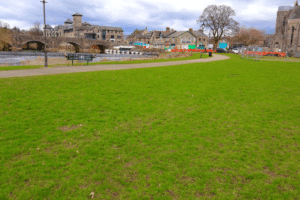Support us from £3/month
We deal with almost 1000 cases a year assisting communities, groups and individuals in protecting their local spaces and paths in all parts of England and Wales. Can you help us by joining as a member?
With the Friends of the Lake District we have slated the decision of a planning inspector to allow flood-defence works on Gooseholme Common in the heart of Kendal in Cumbria.

This photo looks across Gooseholme Common, to the area where the public will be separated from the river by a flood-defence wall, and most of the grass will be taken by the hardstanding for the pumping station. Photo: Open Spaces Society
The application, made by the Environment Agency, was for permanent flood-defence works including walls, kerbs, floodgates, subterranean culvert works with associated hardstanding, access hatches, and a new outfall into the River Kent. In addition, there would be temporary site compounds, and two-metre-high wooden hoardings. Because the works were on common land they needed the consent of the environment secretary under section 38 of the Commons Act 2006.
The Open Spaces Society and Friends of the Lake District objected to the application because of the severely detrimental effect on the common, a substantial area of green space in the town. This is enjoyed by the public for informal recreation and is an important landscape feature of historic value.
In granting consent on behalf of the environment secretary, the inspector Claire Tregembo recognised that the works would have ‘some impact on the common’, but she considered that these were outweighed by the public benefit.
We argued that, in view of the scale and the intrusive nature of the works, the Environment Agency should have offered land in exchange for that to be taken, under section 16 of the Commons Act 2006. It has done this on common land elsewhere in Kendal. However, the inspector rejected this proposal.
Commenting on the decision, Ian Brodie representing the Open Spaces Society said: ‘We deplore the serious loss of green space and the resulting physical separation of people from the riverbank. The Environment Agency and South Lakeland District Council should have found a solution to the flood-risk management problem which did not entail people losing their valued recreational space. We believe this is a serious loss to the town’s cultural and historic heritage, particular its connections with the traditional woollen industry.
‘Instead of an impressive open landscape, we shall have small, contained spaces with a great deal of concrete. It is regrettable that Historic England did not help to prevent the loss of this historic landscape.’
